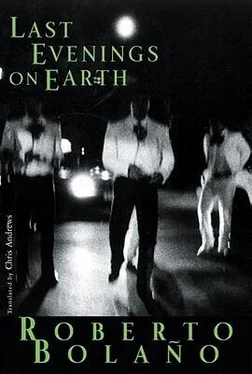When the receptionist goes away, B opens his book of poetry again, but the words are illegible now, so he leaves the book open on the table, shuts his eyes and, instead of the faint chimes of rigging, he hears an atmospheric sound, the sound of enormous layers of hot air descending on the hotel and the surrounding trees. He feels like getting into the pool. For a moment he thinks he might.
Then the woman in the corner stands up and begins to walk toward the stairs that lead from the terrace to the reception area, but midway she stops, as if she felt ill, resting one hand on the edge of a planter in which there are no longer flowers, only weeds.
B watches her. The woman is wearing a loose, light-colored summer dress, cut low, leaving her shoulders bare. He expects her to start walking again, but she stands still, her hand fixed to the edge of the planter, looking down, so B gets up with the book in his hand and goes over to her. The first thing that surprises him is her face. She must be about sixty years old, B guesses, although from a distance, he wouldn't have said she was more than thirty. She is North American, and when B approaches she looks up and smiles at him. Good night, she says, rather incongruously, in Spanish. Are you all right? asks B. The woman doesn't understand and B has to ask again, in English. I'm just thinking, says the woman, smiling at him fixedly. For a few seconds B considers what she has said to him. Thinking, thinking, thinking. And suddenly it seems to him that this declaration conceals a threat. Something approaching over the sea. Something advancing in the wake of the dark clouds invisibly crossing the Bay of Acapulco. But he doesn't move or make any attempt to break the spell that seems to be holding him captive. Then the woman looks at the book in B's left hand and asks him what he is reading, and B says: Poetry. I'm reading poems. The woman looks him in the eye, with the same smile on her face (a smile at once bright and faded, thinks B, feeling more uneasy by the moment), and says that she used to like poetry, once. Which poets? asks B, keeping absolutely still. I can't remember them now, says the woman, and again she seems to lose herself in the contemplation of something visible only to her. B assumes she is making an effort to remember and waits in silence. After a while she looks at him again and says: Longfellow. And straight away she starts reciting lines with a monotonous rhythm that sound to B like a nursery rhyme — a far cry, in any case, from the poets he is reading. Do you know Longfellow? asks the woman. B shakes his head, although in fact he has read some Longfellow. We learned it at school, says the woman, with her invariable smile. And then she adds: It's too hot, don't you think? It is very hot, whispers B. There could be a storm coming, says the woman. There is something very definite about her tone. At this point B looks up: he can't see a single star. But he can see lights in the hotel. And, at the window of his room, a silhouette watching them, which makes him start, as if struck by the first, sudden drops of a tropical downpour.
For a second, he is bewildered.
It's his father, on the other side of the glass, wrapped in a blue bathrobe that he must have brought with him (B hasn't seen it before and it certainly doesn't belong to the hotel), staring at them, although when B notices him, his father steps back, recoiling as if bitten by a snake, lifts his hand in a shy wave, and disappears behind the curtains.
The Song of Hiawatha, says the woman. B looks at her. The Song of Hiawatha, the poem by Longfellow. Ah, yes, says B.
Then the woman says good night and makes a gradual exit: first she goes up the stairs to reception, where she spends a few moments chatting with someone B can't see, then, in silence, she sets off across the hotel lobby, her slim figure framed by successive windows, until she turns into the corridor that leads to the inside stairs.
Half an hour later, B goes to the room and finds his father asleep. For a few seconds, before going to the bathroom to brush his teeth, B stands very straight at the foot of the bed, gazing at him, as if steeling himself for a fight. Good night, Dad, he says. His father gives not the slightest indication that he has heard.
On the second day of their stay in Acapulco, B and his father go to see the cliff divers. They have two options: they can watch the show from an open-air platform or go to the bar-restaurant of the hotel overlooking the precipice. B's father asks about the prices. The first person he asks doesn't know. He persists. Finally an old ex-diver who is hanging around doing nothing tells him what it costs: six times more to watch from the hotel bar. Let's go to the bar, says B's father without hesitating. We'll be more comfortable. B follows him. The other people in the bar are North American or Mexican tourists wearing what are obviously vacation outfits; B and his father stand out. They are dressed as people dress in Mexico City, in clothes that seem to belong to some endless dream. The waiters notice. They know the sort, no chance of a big tip, so they make no effort to serve them promptly. To top it off, B and his father can hardly see the show from where they are sitting. We would have been better off on the platform, says B's father. Although it's not bad here either, he adds. B nods. When the diving is over, and after two highballs each, they go outside and start making plans for the rest of the day. Hardly anyone is left on the platform, but B's father recognizes the old ex-diver sitting on a buttress and goes over to him.
The ex-diver is short and has a very broad back. He is reading a cowboy novel and doesn't look up until B and his father are at his side. He recognizes them and asks what they thought of the show. Not bad, says B's father, although in precision sports you need experience to judge properly. Would I be right to guess you were an athlete yourself? asks the ex-diver. B's father looks at him for a few moments and then says, You could say that. The ex-diver gets to his feet with an energetic movement as if he were back on the cliff edge. He must be about fifty, thinks B, so he's not much older than my father, but the wrinkles on his face, like scars, make him look much older. Are you gentlemen on vacation? asks the ex-diver. B's father nods and smiles. And what was your sport, sir, if I might ask? Boxing, says B's father. How about that, says the ex-diver, so you must have been a heavyweight? B's father smiles broadly and says yes.
Before he knows what is going on, B finds himself walking toward the Mustang with his father and the ex-diver and then all three get into the car and B hears the directions the ex-diver is giving his father as if they were coming from the radio. For a while the car glides along the Avenida Miguel Alemбn but then it turns and heads inland and soon the tourist hotels and restaurants give way to an ordinary cityscape with tropical touches. The car keeps climbing, heading away from the golden horseshoe of Acapulco, driving along badly paved or unpaved roads, until it pulls up beside the dusty sidewalk in front of a cheap restaurant, a fixed-menu place (although, thinks B, it's really too big for that). The ex-diver and B's father get out of the car immediately. They have been talking all the way and while they wait for him on the sidewalk, they continue their conversation gesturing incomprehensibly. B takes his time getting out of the car. We're going to eat, says his father. So it seems, says B.
The place is dark inside and only a quarter of the space is occupied by tables. The rest looks like a dance floor, with a stage for the band, surrounded by a long balustrade made of rough wood. At first, B can't see a thing, until his eyes adjust to the darkness. Then he sees a man coming over to the ex-diver. They look alike. The stranger listens attentively to an introduction that B doesn't catch, shakes hands with his father and a few seconds later turns to B. B reaches out to shake his hand. The stranger says a name and his handshake, which is no doubt meant to be friendly, is not so much firm as violent. He does not smile. B decides not to smile either. B's father and the ex-diver are already sitting at a table. B sits down next to them. The stranger, who looks like the ex-diver and turns out to be his younger brother, stands beside them, waiting for instructions. The gentleman here, says the ex-diver, was heavyweight champion of his country. So you're foreigners? asks his brother. Chileans, says B's father. Do you have red snapper? asks the ex-diver. We do, says his brother. Bring us one, then, a red snapper Guerrero-style, says the ex-diver. And beers all round, says B's father, for you too. Thank you, murmurs the brother, taking a notebook from his pocket and painstakingly writing down an order that, in B's opinion, a child could easily remember.
Читать дальше












